ArcK: research in architecture and interior architecture
Through its explicit civic focus and creative-critical perspective, UHasselt’s Faculty of Architecture and Arts (ARK) engages in fundamental and applied research that supports and enables sustainable cultural and spatial transitions. Starting from our artistic and design disciplines, yet in intense interaction with other disciplines, we strive for impact in the academic, social and cultural domain.
ARK’s research covers a broad range of topics (designing for positive impact, well-being & diversity, civic & policy design, crafts & cultural memory, adaptive re-use & heritage,...) and is known for its innovative research methods (live projects, artistic research, research by design,...). ARK is a trusted partner and coordinator in European and nationally funded projects and collaborates with external organizations, such as companies, governments, and non-profit/cultural organizations.
Our research is clustered in 6 research domains: ‘Civic & Policy Design’, ‘Sustainability’, ‘Designing for more’, 'Retail Design', ‘Trace: heritage & adaptive reuse’ and ‘Marges’.


Research domains
News and events
Collaborate with ArcK
ArcK strives for meaningful contributions to society and raises a critical voice in the social debate. We share our knowledge and expertise with society in multiple ways. In addition to the (open access) publication of our research results, collaborations with external organizations (companies, governments, non-profit, etc.) are an indispensable way of knowledge and technology transfer to the field.

Is your organization confronted with particular challenges? Are you looking to extend your organization’s services with state-of-the-art knowledge and tools? Are you looking for (design) guidance in the domains of participation, sustainability, re-use, retail design, inclusive design, or design for wellbeing?
Contact our business developer and let’s explore a collaboration! A few scenarios for collaboration are outlined below, but we are happy to discuss a customized solution with you.
Why collaborate with ArcK?
- state-of-the-art research
- objective and independent advice
- internationally recognized researchers with extensive expertise
- multidisciplinary setting spread over 5 research domains
- multiplicity of research methods and extensive expertise in research by design
- attention for an inclusive and sustainable design process and result
- applicability and societal relevance are at the core of our research
- our research addresses (design) support for clients, designers, government agencies
- we strive for a customized collaboration
How to collaborate with ArcK?
The preferred form of collaboration and knowledge exchange depends on the goal and scope of your question, ranging from a student assignment to a joint research project or a license.
A student assignment
A student assignment
A student assignment can be conducted at very low cost. One of the advantages is that students are typically out-of-the-box thinkers. Combined with the expertise of the teacher, this provides good ground for innovative ideas. For our students it is interesting to work with real-life challenges. Of course the project must fit the academic curriculum and project ideas should be raised well in advance. A specific form of a student assignment is a bachelor’s or master’s thesis.
- Who is involved: student, teacher
- Timing: depends on the project, early application is necessary
- Price: very cheap
Academic consultancy
Academic consultancy
Academic consultancy is a key way to share our state-of-the-art knowledge. Questions for a consultancy project can be raised anytime and we will make a tailor-made offer. Subsidies are possible, such as the VLAIO “KMO portefeuille”. Depending on the size of the project, we will apply our general terms for academic consultancy or arrange a collaboration agreement
- Who is involved: researcher (student)
- Timing: depends on the project, short term application possible
- Price: price offer, subsidies are possible
Joint Ph.D. project
Joint Ph.D. project
A joint Ph.D. project can be set up between our university and your organization. This creates an ecosystem for Ph.D. students to explore regional and global challenges in close collaboration with social or economic actors. Unlike academic consultancy that usually starts from existing knowhow and expertise, Ph.D. research typically involves novel and innovative research. A Ph.D. project has a duration of two times two years. There are special funding channels that co-finance a Ph.D. project in collaboration with an external organization, for example VLAIO Baekeland.
- Who is involved: ph.D. student, scientific promoter, industrial promotor
- Timing: 2 times 2 year, dependent on funding channel
- Price: Baekeland, VLAIO, Civic PhD UHasselt
A research Project
A research Project
A research project is often executed in close collaboration with one or more external actors and is (co-)financed by a third party (e.g. FWO research fund Flanders, VLAIO, H2020, etc.). The role and input of your organization depends on several factors such as the research questions, the project type and funding channel. The application date is directly related to the call of the funding channel. Research projects have a duration of 2 to 5 years.
- Who is involved: researcher(s)
- Timing: 2-5 years, application date dependent on call
- Price: different funding channels
A license
A license
A license can grant you access to our innovative and science-based tools and platforms, to strengthen your market position. The conditions (timing, fee and scope of the license) will be arranged in a mutual agreement. Currently, we have a few interesting technology offers (see the section below “collaboration opportunities”).
Collaboration opportunities
Sketch Atlas
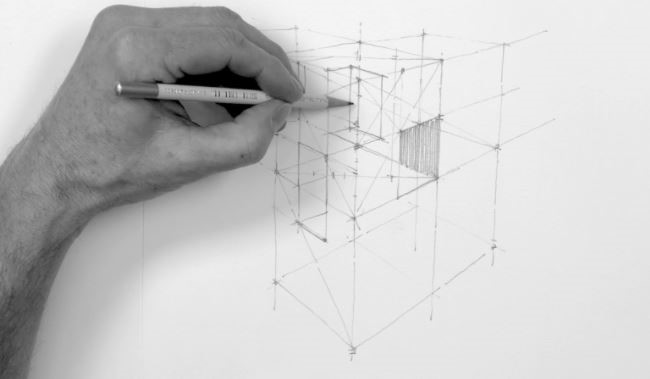
- For publishers and universities.
Sketch Atlas is a platform that supports (first year) academic bachelor students in (interior)architecture in freehand architectural drawing.
It consists of specialized high quality video tutorials and also integrates a digital feedback module to facilitate digital evaluation of students’ sketching skills.
Our mission is that everyone can learn to draw.
By using the Sketch Atlas, freehand architectural drawing can be learned step by step.
Visit the website of Sketch Atlas for more information.
Outstanding opportunity: UHasselt is currently looking for interested parties to set up a collaboration for commercialization of the Sketch Atlas and is offering test licenses to interested universities that want to use Sketch Atlas.
Retail Design Kick-off Platform
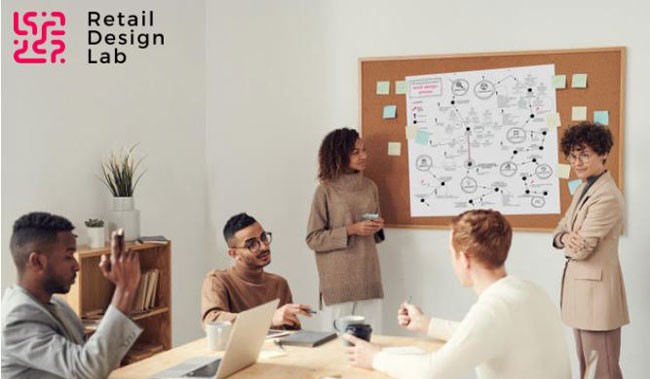
- For retailers, retail consultants, retail designers
Value creation and in-store experience should be considered together from the start of the retail design process. This improves the end result and avoids the cost of having to alter the design at a later stage due to misunderstandings or unsatisfied customers.
The Retail Design Kick-off Platform was developed by the Retail Design Lab of ArcK to help retailers and designers with this. It triggers a more experience-focused reflective process at the analysis phase of a retail design project.
The tool prompts the retailers and designers to adequately consider all the elements that contribute to the value of in-store experience and asks the right questions at the beginning of the design process.
Outstanding opportunity: The Retail Design Lab is currently offering test licenses to interested parties. In return for reduced pricing, we expect feedback on the tool.
Experience Design Generator
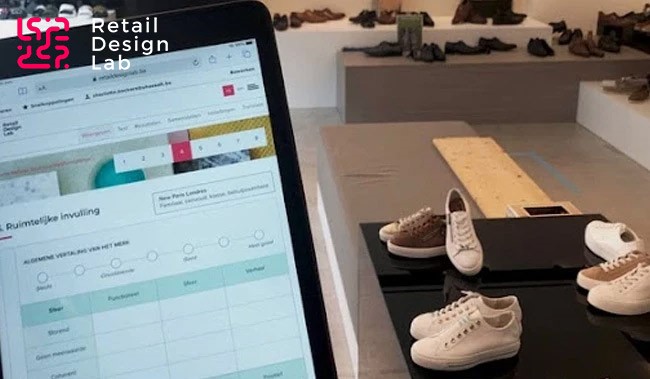
- For experts in retail design (consultants and designers)
The Experience Design Generator (EDG) is a tool that measures ‘experience’ in a physical store. It was developed by the Retail Design Lab, an expertise center of ArcK. The tool differentiates between four sectors: fashion, furniture/home-deco, food and pharma/cosmetics. The EDG is structured among six sections: exterior, interior shell, spatial concept, sensory aspects, communication and overall experience. The tool is implemented in the website of the Retail Design Lab and is available in Dutch and English. The output quantifies the level of experience in the store and provides potential improvements in terms of experience. Expertise in retail design is required to use the EDG.
Outstanding opportunity: The Retail Design Lab is currently offering test licenses to interested parties. In return for reduced pricing, we expect feedback on the tool. Only a limited number of licenses, spread over Europe, are available in this phase.
Tools in open access
A number of our tools are available in open-source and can be used free of charge. All tools originated from academic research and provide objective and neutral information without any commercial interest. Try them and experience how they might support and improve your organization.
Comfort Tool
Comfort Tool
- target audience: building clients and architects
The Comfort Tool is science based and aims to encourage Belgian citizens to renovate or build their houses more energy efficiently, with attention to Universal Design and lifelong living. The Comfort Tool supports building clients in improving the comfort in their dwelling, now and in the future, based on their needs and wishes. It supports them in asking the right questions to other parties involved in the building process: architects, contractors and real estate agents.
The Comfort Tool is developed at the Faculty of Architecture and Arts in the context of the research project ‘Proeftuin Mutatie +’, financed by the Research Foundation Flanders (FWO). It is available free of charge via https://www.comforttool.be/.
Participatory design tools
Participatory design tools
- target audience: governments, citizens and citizen collectives, spatial planning -, design -, architectural - and engineering firms, …
The team of Spatial Capacity Building has plenty of experience in developing and facilitating participatory design processes. We developed multiple tools and platforms to enter into dialogue with a multitude of stakeholders (local governments, communities, citizens, enterprises, design offices, etc.). All our tools differentiate depending on the context within which they were developed.
- ‘De Andere Ruimte’ (‘The Other Space’): https://deandereruimte.bmks.be/
“De Andere Ruimte” is an app to mark routes and spaces and to collect and make an inventory of stories of the environment. The data and stories can subsequently be shared with other stakeholders.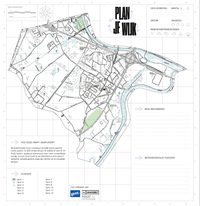
- ‘map-it’: http://www.map-it.be/
MAP-it is developed to support groups in quickly drawing an action plan for a (neighborhood) project. It is a low-tech toolkit that visually maps values, objectives, actors, projects and instruments and subsequently facilitates a conversation with others. It is especially suited for groups with a high diversity of expertise, background and knowledge.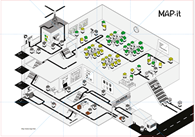
- ‘Participatie Studio’ (‘participation studio’): https://participatiestudio.be/
The ‘Participatie Studio’ is a learning environment where participants learn from previous participation steps to subsequently plan new steps. The tool consists of a series of exercises and terms that focus on questions such as ‘how do I give direction to a participation process?’ or ‘how do I strengthen the participation culture of an organization?’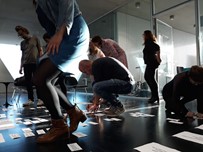
Retail design tools
Retail design tools
- target audience: retail designers and consultants, retailers

The Retail Design Lab, an expertise center of ArcK, conducts research on the factors that influence the design of experience-oriented stores. Based on scientific research, multiple tools are developed that support designers and retailers in creating more experience-oriented stores.
There are also tools supporting designers in selecting materials from an experience point of view and that also have a low impact on the environment.
You can find the tools on https://www.retaildesignlab.be/en/tools
UD Scan
UD Scan
- target audience: tourist accommodations, suppliers for tourist accommodations
Universal Design (UD) or ‘Design for All’ is a design strategy that states that everything that we design should be usable by as many people as possible, and should support this diverse group of people in the best possible way without stigmatising anyone. UD is a central concept in the development of ‘inclusive tourism’ or ‘tourism for all’. Tourist accommodations and suppliers for tourist accommodations experience difficulties in applying the existing UD knowledge into practice, despite the large potential of UD.
In collaboration with the PXL University College, researchers of ‘Designing for More’ developed a UD scan that helps tourist accommodations and suppliers to increase their insight into the (economic) opportunities of inclusive tourism. The UD Quick scan is designed to inspire suppliers of tourist accommodation in their transition to a UD business plan. The UD Scan for tourist accommodations is very extensive and should be conducted in collaboration with the UD project team.
For more information please visit https://www.udwoonlabo.be/portfolio-items/tools-en-publicaties/ or contact our business developer.
Hemp lime in building design: practical guides
Hemp lime in building design: practical guides
- target audience: architects, engineers, contractors, building clients
How is hemp lime applied in a building construction? What is its expected hygrothermal performance in practice? Which factors should be considered when designing a building in hemp lime? How should the building details be conceptualized?
The results of a two-year research project into the characteristics and application of hemp lime in Flanders are bundled in two practical guides comprising design and construction guidelines and examples in practice. They are available at this website.
Stories of collaborations
Training for professionals
Postgraduate program: Building Beyond Borders
- Focus: regenerative and distributive design and building processes
- Target audience: architects, urban planners, designers
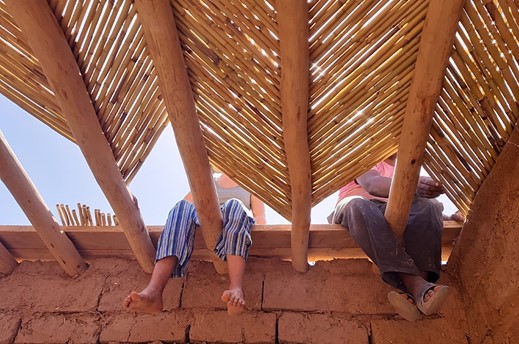
The Building Beyond Borders postgraduate certificate is a bi-annual learn-and-act programme for graduates and professionals who want to become a change-maker in the built environment. The programme includes a series of theoretical sessions, lectures, workshops, hands-on experiments and design explorations.
Supported by academic insights in regenerative and distributive solutions for our built environment, participants take up the role of designer, manager of a building community, coordinator of participatory processes or hands-on construction workshops, developer or producer of new building materials. They concretize their role in designing and realizing a real-life project while collaborating with local stakeholders, craftsmen, multidisciplinary experts and professionals.
Building Beyond Borders offers a comprehensive programme (30 ECTS) to graduated students and professionals. Every bi-annual programme has a unique focus. It is structured in three modules: theory & design, act & develop, build & reflect.
Masterclass ‘Participation tools’
- Focus: Learning to analyze and facilitate participatory processes within spatial design
- Target audience: civic administrators of the departments of environment, mobility, culture, youth, communication (among other) and civil society organizations
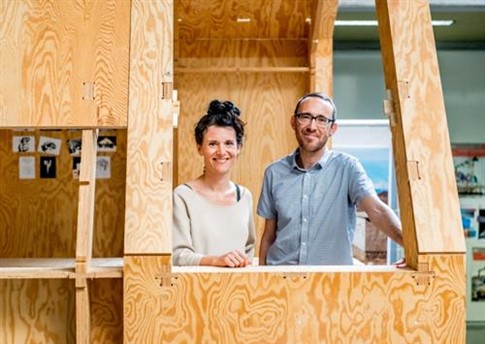
Academic research on participatory spatial planning processes generates a lot of data that researchers subsequently analyze, interpret and evaluate. These data are the basis for the development of a diversity of participation tools and to test them in practice.
In this masterclass we want to share our knowledge about the development and application of these participatory design tools with a wide audience. The focus of the masterclass is the daily practice of designing and facilitating participatory processes, and not the theory of what participation is.
In six interactive sessions the masterclass covers a full participatory process from initiating, over planning, implementation, documentation, and reflection to adjusting a process. Each step of the process is related to particular tools.
Information and contact
Prof. Dr Liesbeth Huybrechts
Dr Lieve Weytjens
Business developer










